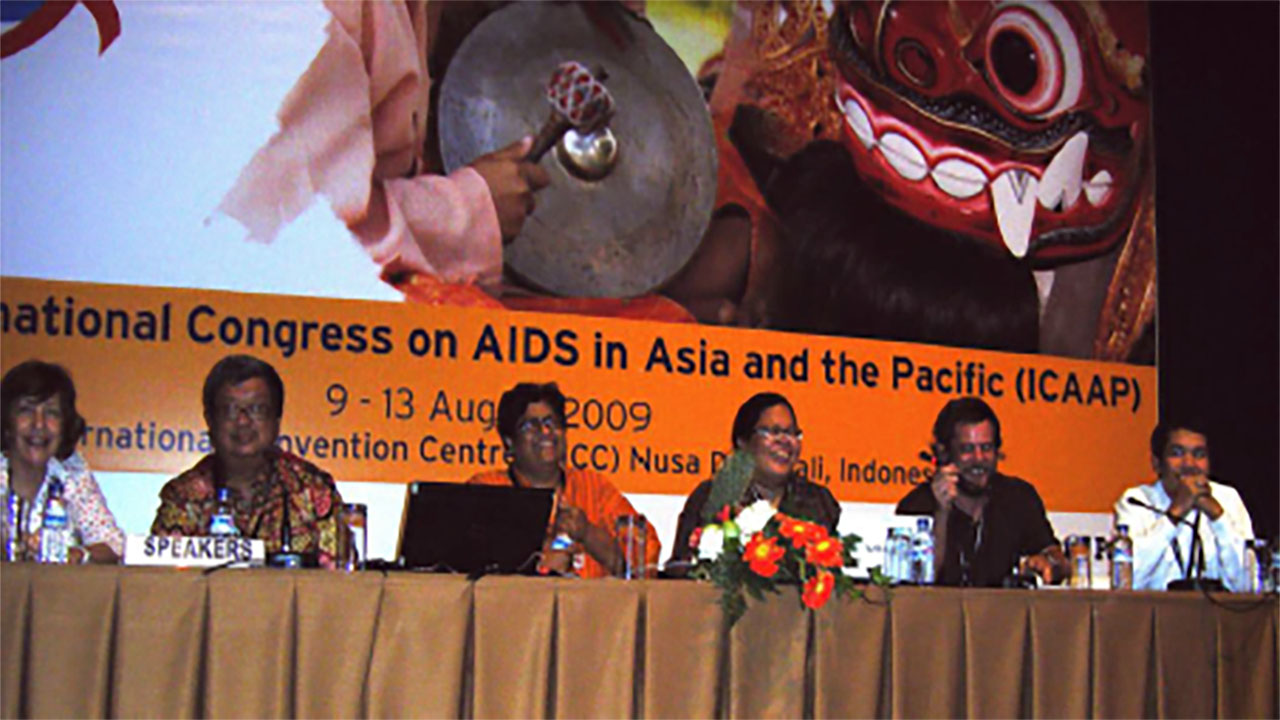
Bali, Indonesia
9th International Congress on AIDS in Asia Pacific (ICAAP) in Bali, Indonesia
PGA participated at this year's 9th International Congress on AIDS in Asia Pacific (ICAAP) in Bali, Indonesia on August 9-13, 2009 with the central theme of "Empowering People, Strengthening Networks". PGA's satellite meeting took stock of regional developments in Asia Pacific since the last ICAAP 8 in Colombo, Sri Lanka. PGA's delegation also participated in sessions held by other NGOs, UN agencies and civil society.
PGA's satellite meeting, "Parliamentary Action Post-ICAAP 8: The Way Forward", was held on August 12th. The main goal was to discuss specific challenges and successes faced by lawmakers in addressing HIV. The speakers included Dr. Donya Aziz, MP (Pakistan), Ms. Marie Norden, MP (Sweden), Ms. Sapana Malla, MP (Nepal), Hon. Ain-ullah Shams, MPA, Balochistan Provincial Minister for Health, Dr. Nafis Sadik, Special UN Envoy of the Secretary General for HIV/ AIDS in Asia Pacific and Dr. Nasir Khan, Program Manager for the Provincial AIDS Control Program for Balochistan.
The Welcome Note was given by Ms. Marie Norden, MP (Sweden), Executive Committee Member and Convenor of the SDHP Program. Ms. Norden briefly highlighted past PGA Regional Seminar successes and provided a short history of the key ground work PGA has provided in engaging parliamentarians in the South Asian Region in addressing HIV. She stated the importance of prevention in addition to treatment and that prevention should not take place at the cost of treatment. Governments need to work with other actors in the field to directly engage and access groups that need the help. Ms. Norden also mentioned that as a donor country it is also important to understand that these governments are accountable to their taxpayer citizens and stressed the importance of accountability and transparency to increase the aid effectiveness. The main goal is to strengthen and harmonize political leadership, but more importantly the national and local frameworks so that resources are utilized in an optimal manner therefore delivering communities the services they need.
Among the regional legislators present the consensus was that there have been small successes which should be built upon. Dr. Sadik stressed the importance of gender equality and the need for education for both men and women that will help to end discrimination towards women. She also highlighted the Commission for HIV and AIDS in Asia and that the report can serve as an important tool for parliamentarians in understanding certain drivers of the epidemic in the region.
Ms. Sapana Malla, MP (Nepal) stated that as a member of parliament and as an individual who is active in this area, she would like to report a list of success, but this is not the case. She spoke of the numerous challenges currently facing Nepal politically and institutional reform. Ms. Malla stressed that despite these challenges, addressing HIV is still important and advocacy work is a priority. She mentioned that Nepal does have a Domestic Violence and Punishment Act that criminalize marital rape. Ms. Malla brought up an important point, "how many of us (MPs) bring up HIV issues in parliament?" and also how many make it a priority to know their constituents so we better understand the issues affecting them.
Dr. Donya Aziz, MP (Pakistan) Executive Committee Member and Deputy Convenor of the SDHP Program, outlined the changes taking place in the HIV areas in Pakistan from a parliamentary perspective, but much work still remains. Dr. Aziz spoke small steps she has actively taken to re-address issues that have come up in relation to references made to HIV. She also stated the importance of using the full descriptive term and not the acronym when talking about issues such as men having sex with men, not MSM. Acronyms are not understood by the general public and the intended message is not reached to the community.
PGA also used this opportunity to have a small delegation from the Balochistan Province of Pakistan to participate and present during this ICAAP. The joint presentation was made by Dr. Nasir Khan, Program Manager for the Provincial AIDS Control Program for Balochistan and Hon. Ain-ullah Shams, MPA, Balochistan Provincial Minister for Health. Dr. Khan provided an overview of the HIV/AIDS program for the province, but stressed that it has been difficult to progress in recent times and more work is needed in the area. He stated that there are testing centers, but more resources need to be accessed. Hon. Shams spoke about the importance of addressing HIV and the need to eliminate the disease. He mentioned that monogamous martial relationships are central, that more advocacy on this topic needs to be done in Balochistan and that attending conferences like helps politicians to understand the issue better.
